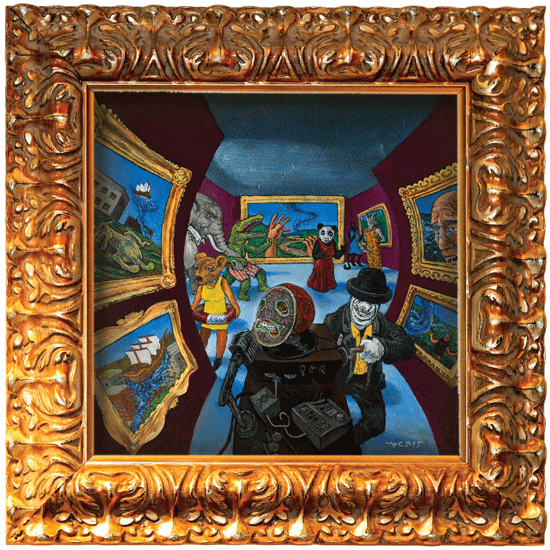Kleenex Girl Wonder just released 13th LP The Comedy Album. Graham Smith, who’s been making pan-genre pop rock in bedrooms, studios, forests and everywhere in between under the KGW name with various people since 1994, joins MAGNET as guest editor this week. Climb inside his skull as he figures out what it’s all about, whatever “it” may be.

Smith: I came up with the album title The Comedy Album in 2013, as a batch of songs was growing into something resembling an album. Part of the logic behind doing a “concept album” (of sorts) has to do with superstition: By the math I use to determine how many Kleenex Girl Wonder albums there have been (which math is very non-scientific), this would be our 13th album, so there was a chance that it could be an unmitigated disaster, because the universe has a brain and feelings and is always trying to sabotage people’s dreams based on numerological significance. I decided that this newly named album should be four things: 1) a Kleenex Girl Wonder album (easy), 2) a comedy album (easy to technically get correct, but next to impossible in terms of getting it filed alongside stand-up concert recordings), 3) a dance album (unusual) and 4) a work of art (again, one of those 100-percen/0-percent goals I seem to love so much).
There is a lot of danceable material on the album, I think. Even the songs that are produced without front-of-house friendly electronic thumps have solid grooves that dance-floor revelers can sink their foot-claws into. As far as a work of art, I think the LP cover art proves that I technically achieved this goal; you could certainly hang the record on your sitting room wall and only the keenest eyes would find themselves batted. So that leaves the comedy part.
My lyrics have always had a certain amount of humor to them. This is completely unsurprising (to me), as I grew up idolizing two of the world’s greatest funny tunesmen: “Weird” Al Yankovic and Tom Lehrer. I still think “Weird” Al is great, and I’m glad that he has never stopped doing that thing he does (however you think it should be classified) and finally achieved the arena-sized success he so richly deserves. But in terms of actually influencing the way I write songs, Tom Lehrer is a much bigger influence. It took me many years to realize that while I think his material is funny, and that’s part of its appeal to me, his long-lasting replay value is more a result of just how good he was at writing melodies (the less-than-perfect singing voice helped too, but mostly in helping me feel less self-conscious about screeching my truth).
So once I started developing the “comedy album” concept, I tried to consciously plan what I wanted to explore. Concept albums are, almost always, a drag; either the concept is so broad that there’s really nothing separating it from “any old album” (cf. my own Ponyoak, which I and others refer to as a “concept album about breakups,” as though heartbreak was a radical subject matter to tackle through pop music, which usually concerns itself with topics such as how to build a shed or why some insects have so many developmental stages) or spend so much time on world-building and exposition that they are difficult to relate to on a purely emotional level. The inspiration for a comedy-themed album was rooted in my experiences interviewing numerous funny people for a podcast I co-hosted, and an increased interest in the business of stand-up comedy—surely, though, that would make for some weird-ass songs, although I did write a couple lyrics here and there that referenced that world (“tight fifteen” is not an ersatz Steely Dan homage, thank fucking God).
The solution was to explore a couple of discrete thought processes I’ve struggled with all my life, which also let me use a variety of rhetorical and narrative devices: Why do I get such a charge from being funny? Why is it a priority in so many aspects of my personal and professional life? And why do we, as a people, find it so useful to use humor to deal with our darkest emotions, e.g. fear of death, loneliness, isolation, alienation, failure, etc.? I don’t think these underlying themes are readily apparent to the casual listener, but that’s fine—see above for why you want to avoid the use of blunt objects (such as anvils) when tip-toeing through the tulips of this territory. If nothing else, it gave me a much better excuse to cram some knee-slappers in there. And the best case scenario is I provided some food for thought for other people who may struggle with the curse of being hilarious, as I do, every single day.





